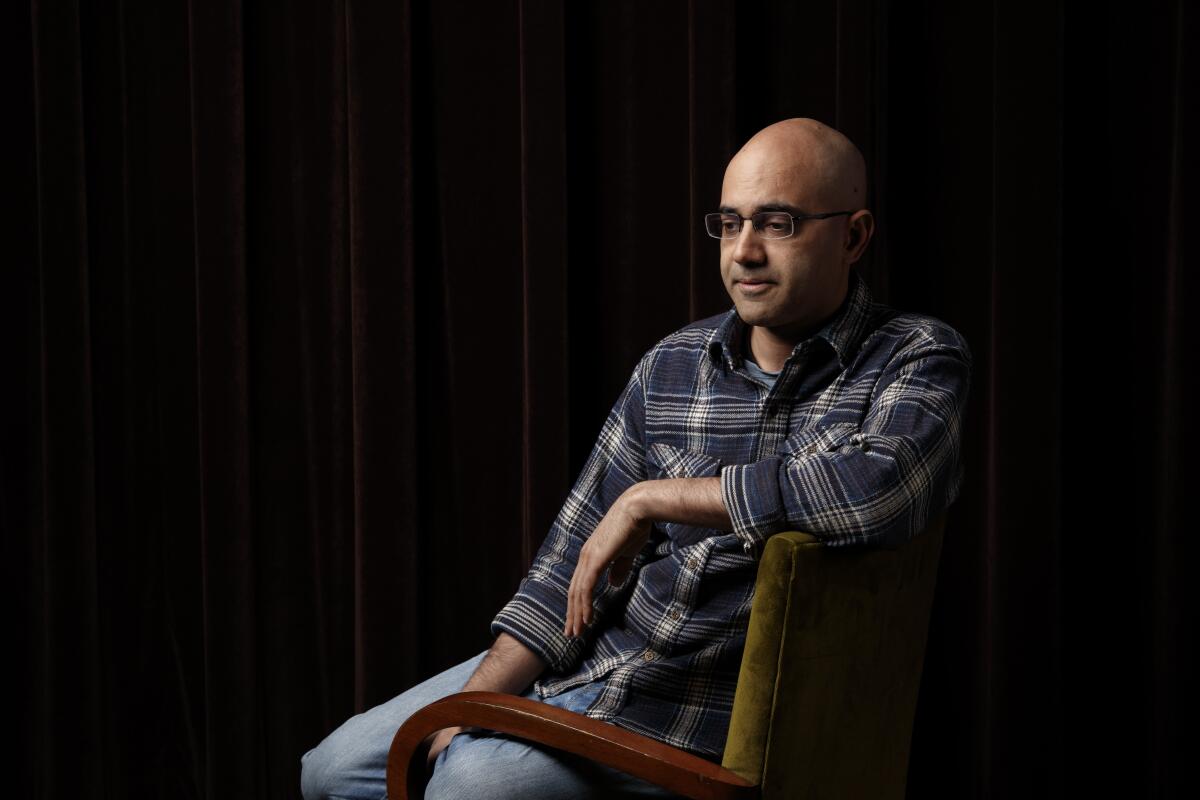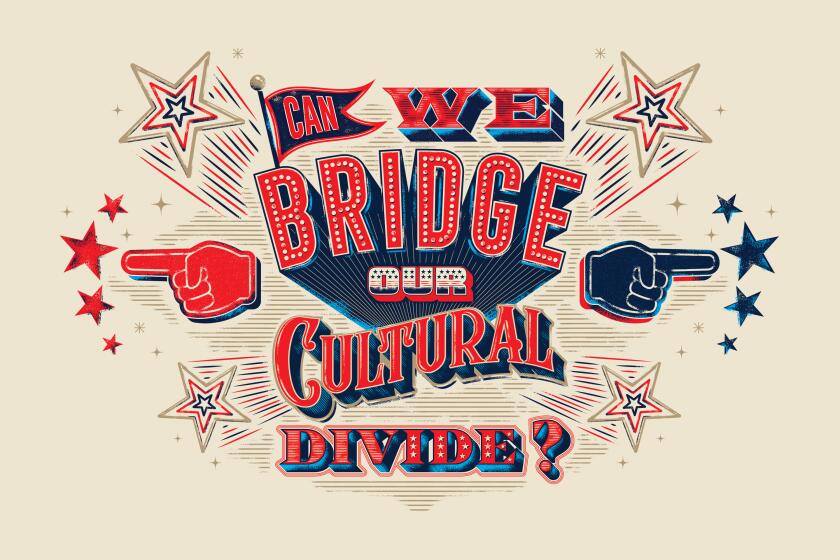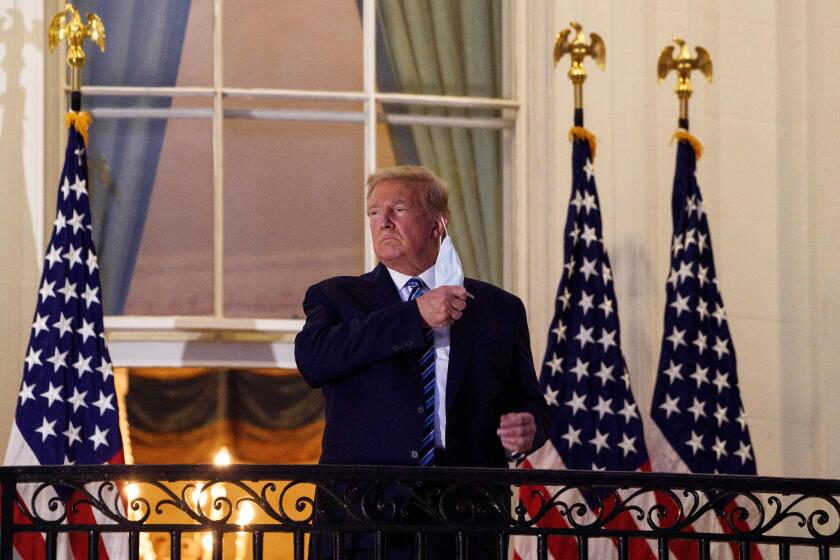Election 2020: Trump? Biden? No matter who wins, artists must help repair a broken nation
There’s a small yet potent scene tucked away in the sprawl of “The Inheritance,” Matthew López’s epic gay drama that arrived on Broadway last year, which re-creates the experience of the 2016 election returns, when Donald Trump pulled off one of the greatest upsets in modern political history. For progressive theatergoers, this part of the play should come with a trigger warning.
A group of liberal gay New Yorkers has festively gathered to watch America elect its first woman president. But as the results come in, the mood turns funereal. The trajectory of that fateful evening is captured in a concert of increasingly alarmed voices.
“Clinton takes New York!” “Nevada too close to call.” “They just called Ohio.” “Nate Silver has her at 72 percent.” “They just called North Carolina.” “Sixty-seven percent.” “There goes Florida.” “Fifty-three percent.’ “This is bad. Is this really happening?” “They just called Pennsylvania. That’s it, then. It’s over.” “It’s over.”
The prospect of reliving a version of this night on Tuesday has Republicans licking their chops and Democrats calling their pharmacies. As someone who sees Joe Biden as the last exit before authoritarianism, I don’t know how I’d cope with four more years of Trump chaos. But the time has come to take the long view. Regardless of the outcome of the 2020 election, the fabric of the nation must be repaired — and no one is excused from this necessary work.
What role can artists play in the healing of a nation wounded by a viral pandemic and the chronic diseases of racism, inequality and rabid partisanship? Even for the proponents of art for art’s sake, politics is inescapable.
Aesthetes may be oblivious to the news crawl, but they don’t get to choose the conditions in which they work. To create is to bear witness, directly or indirectly, to life as it is lived at a specific historical moment. The macro and the micro inexorably converge whenever words, color, voices and bodies are arranged into vision.
Whether Trump or Biden wins, difficult repair works lies ahead after election 2020. Can we bridge our cultural divide?
As a critic belonging to no theoretical camp, I see little point in being programmatic or prescriptive. The delicate process of creativity isn’t determined by the will. But the cultural land becomes more arable when there’s broad recognition that artists matter to civic life, that their contributions clarify and cleanse the collective imagination.
“Relevance,” that favorite word of press releases, is overrated. The ancient Greeks and Shakespeare understood the advantage of distance, of grappling with dramatic material at a remove from contemporary existence. Censorship, in all its official and unofficial manifestations, is a persistent foe. But perhaps more formidable is the suppressive operation of our internal defenses, which screen the inconvenient and the uncomfortable from view.
How can art break through the bulwark? “Tell all the truth but tell it slant,” advises Emily Dickinson. “The Truth must dazzle gradually / Or every man be blind.” Artistic truth, which looks beyond the shifting political scorecard, depends more on imagination than the news cycle.
This is a roundabout way of saying that not everything need be about Trump. But if this figure of obsession cannot be resisted, let’s at least adopt a wider focus, one that recognizes him as more of a symptom than a cause.
Three works that have crossed my path in recent weeks — one a podcast drama, one a digital play reading and one a novel — fearlessly confront the political moment. Trump looms large in all of them, but the chief protagonist is America itself.
In the podcast drama “Shipwreck: A History Play About 2017,” playwright Anne Washburn strands a group of urban liberals in a converted farmhouse in upstate New York during a winter storm and has them air their political grievances and confess their hidden thoughts about the man they think is manifestly unfit to be president. The drama, a co-production of the New York Public Theater and the Woolly Mammoth Theatre Company in Washington, D.C., looked like it might take an apocalyptic turn similar to Washburn’s best-known work, “Mr. Burns, a Post-Electric Play.”
But true to its subtitle, “Shipwreck” chronicles the recent political past in a manner that blends history play melodramatics with talky, topical realism. It’s an unstable mix, and the interludes flamboyantly enacting Trump’s fateful White House dinner with James Comey, an occasion when the president reportedly asked his FBI director for a pledge of loyalty, seem especially awkward in the podcast format.
As the election looms, the movies remind us that democracy thrives on an experience of public togetherness.
As a character from the farmhouse says in a discussion about political theater, “Art needs time and space and reflection.” “Shipwreck,” which had its theatrical premiere last year at London’s Almeida Theatre, is daring in style and scope, but the play feels rushed in places, as though Washburn were writing on deadline.
But the boldness of imagination keeps this from being another docudrama rehash of the journalistic record. What sets the intrigue in motion is the discovery made by the farmhouse friends, a circle smugly assured of its enlightened like-mindedness, that a Trump voter is in their midst. But even more mind-blowing for the characters is the realization that their own political self-image may not perfectly align with the contradictions and wild doubts lurking at the edge of consciousness.
Dissatisfaction and disillusionment churn in red and blue states alike. Could bridges be built on this angry ground? In “Heroes of the Fourth Turning,” Will Arbery’s critically lauded play about young, white conservative Catholics auditing their consciences in the age of Trump, left-leaning theatergoers unaccustomed to spending extended amounts of time with right-wing true believers are immersed in the confessions and conversational squabbles of characters who, despite their ideological war cries, remain humanly identifiable in their quandary over how to live a good life.
In October, playwright Jeremy O. Harris presented a virtual production of Arbery’s play, which reunited the original cast from the 2019 world premiere at Playwrights Horizons. When I wrote briefly about that off-Broadway production, I commented on the way the audience hung on to every word as if it might unlock the source of our undying culture wars.
The drama, a reunion of friends affiliated with a Wyoming Catholic college, unfolds in anguished monologues that give voice to the irreconcilable conflicts between dogma and political expediency, faith and physical life. The value of “Heroes” lies more in sociopolitical experience than insight. What distinguishes the play is its invitation to audience members to engage with viewpoints that may be vastly different from their own, to spend time with sexually pent-up characters who believe abortion is a mortal sin and carnal relations outside of marriage a shocking revelation, and to examine the way desired political ends are used justify Steve Bannon-esque means.
Toxic individualism has led the U.S. to have one of the highest COVID-19 death rates in the world. It’s time for a new national myth.
Great art is said to remove the scales from our eyes, but many of us need our ears unplugged. Ayad Akhtar’s brilliant novel “Homeland Elegies,” the most incisive diagnosis of the ailing American zeitgeist that I’ve come across this year, goes one step further: It changes the filter of our minds.
Author of the Pulitzer Prize-winning drama “Disgraced,” Akhtar is that rare amphibious talent, as adept as a novelist as he is as a playwright. “Homeland Elegies” balances autobiography, gripping fiction, social criticism, economic history and the testimony of racial and religious minorities. Trump, a patient of the narrator’s cardiologist father, is a character in the book. But the story goes beyond a figure whose ubiquity is itself an indication of something deeply amiss.

At one point, the author’s surrogate is channel surfing before midnight and notices that all anyone on late-night television is talking about is Trump. “We were a nation in thrall to our own stupidity,” he says. “What passed for politics now was just dramaturgy. Sow conflict, promise consequence. Perhaps Plato wasn’t wrong to warn us about a city overrun with storytellers.”
Never letting himself off the hook, the narrator adds: “I did what everyone else did. I watched. And kept watching.”
Yet Akhtar does more than watch — he sees beyond the surface into the roiling depths that have driven us into this fractious state. “Homeland Elegies” paints an alarming portrait of a nation that has reaped the harvest of its “remunerative individualism,” but a scene from the novel’s coda offers some hope.
The narrator sits in on a seminar on Walt Whitman’s “Democratic Vistas” that is being taught by his college mentor. He is impressed by the students’ invigorating discussion and later comments to his professor friend that he didn’t recognize the coddled, censorious, consumerist students she had been complaining about. Her reply suggests an artistic path forward: “I don’t want to take too much credit. But I have had all of them for at least two semesters before they take that seminar. We’ve had time to get into the practice of thinking.”
Artists, like Akhtar, are after more than the diversion of superficial sentiment. They want to move us into thought. Empathy needs intellect to become more than a passing fancy. The road ahead is going to require all of our wits. Literature and theater may not be able to provide precise directions, but in the right hands they can be a compass for a society that has lost its way.
Biden HQ on “Animal Crossing,” the right’s revenge after AOC’s genial “Among Us” Twitch stream, a board game called “Propaganda.” Election politics in games.
More to Read
The biggest entertainment stories
Get our big stories about Hollywood, film, television, music, arts, culture and more right in your inbox as soon as they publish.
You may occasionally receive promotional content from the Los Angeles Times.













